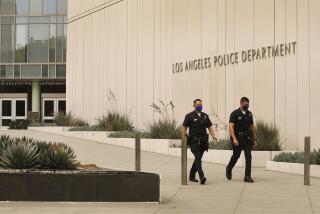Privacy advocates sue LAPD, Sheriff’s Department
Privacy rights groups on Monday filed a lawsuit against Los Angeles County’s two major law enforcement agencies after they refused to turn over information collected by electronic license plate scanners, the suit claimed.
The Los Angeles Police Department and L.A. County Sheriff’s Department have made use of the plate-reading technology for several years. Typically mounted on patrol vehicles, the small cameras continuously scan license plates and check them against criminal databases in search of stolen cars and cars registered to known fugitives.
Police and sheriff’s officials have lauded the technology, saying it snares far more stolen vehicles than officers can on their own. And because the cameras record the exact time and location of a scanned car, police also see the devices as a potentially powerful tool for detectives trying to retrace the whereabouts of someone suspected of a crime — even if it is several months or years after the car was scanned.
In filing the suit, however, the American Civil Liberties Union of Southern California and the Electronic Frontier Foundation raised concerns that the license plate information collected and stored by the two departments invades people’s privacy.
Peter Bibring, an attorney with the ACLU of Southern California, said his group has no objection to police using the cameras to search for stolen vehicles but wants the LAPD and Sheriff’s Department to quickly erase any data on cars and drivers not connected to any crime.
“This technology has led to police maintaining data on every resident of Los Angeles that they manage to scan … even law-abiding residents, and that’s a real concern,” Bibring said in an interview with The Times.
Bibring called on the two departments, which help set standards among police agencies in Southern California because of their size, to rewrite their policies to ensure that information on law-abiding drivers is destroyed within a few weeks of its capture by the scanners. “There is little value of keeping it for six months or a year or two years. But there are big risks to privacy,” he said.
Currently, the Sheriff’s Department keeps data collected by the cameras indefinitely, said spokesman Steve Whitmore. LAPD Lt. Andrew Neiman declined to comment, citing the lawsuit. City rules on record retention, however, indicate that such information is kept for five years.
LAPD Chief Charlie Beck declined to comment, saying he had not yet read the lawsuit. However, he has spoken out before on the need to collect and store license plate data.
“As an investigative tool, it has unlimited potential,” Beck said in an article published on the website Govtech.com. “That will be its strongest use … being able to track vehicles — where they’ve been and what they’ve been doing — and tie that to crimes that have occurred or that will occur.”
Similarly, Whitmore defended the practice, saying license plate data helped solve at lease one slaying case. Months after the 2010 shooting death of a man in Long Beach, five people were arrested in connection with the killing. Detectives were able to crack the case, Whitmore said, in part because shortly after the killing, a sheriff’s license plate reader happened to capture a van believed to have been used in the killing near where the shooting occurred.
The Sheriff’s Department has 77 vehicles outfitted with the plate readers, although only about 45 are currently in operation while the others undergo upgrades to improve data storage capabilities, Whitmore said. Also, the sheriff uses 47 other cameras in fixed locations across the county, he added. Neiman estimated that about 100 LAPD vehicles are equipped with the scanners — a dramatic increase from 2008 when the department had only about a dozen.
The technology is used widely by police. According to a 2012 report by the Police Executive Research Forum, 71% of police departments reported using license plate scanners.
The lawsuit filed Monday stems from requests the two groups made under the state’s Public Records Act for one week’s worth of license plate data collected by the two agencies. Both departments refused, saying the information was investigative material and therefore did not need to be released under the records act. Bibring said attorneys for the two groups will try to convince a judge otherwise.
“Nothing will demonstrate to people the threat to their privacy as clearly as the release of this data,” Bibring said.
More to Read
Start your day right
Sign up for Essential California for news, features and recommendations from the L.A. Times and beyond in your inbox six days a week.
You may occasionally receive promotional content from the Los Angeles Times.







